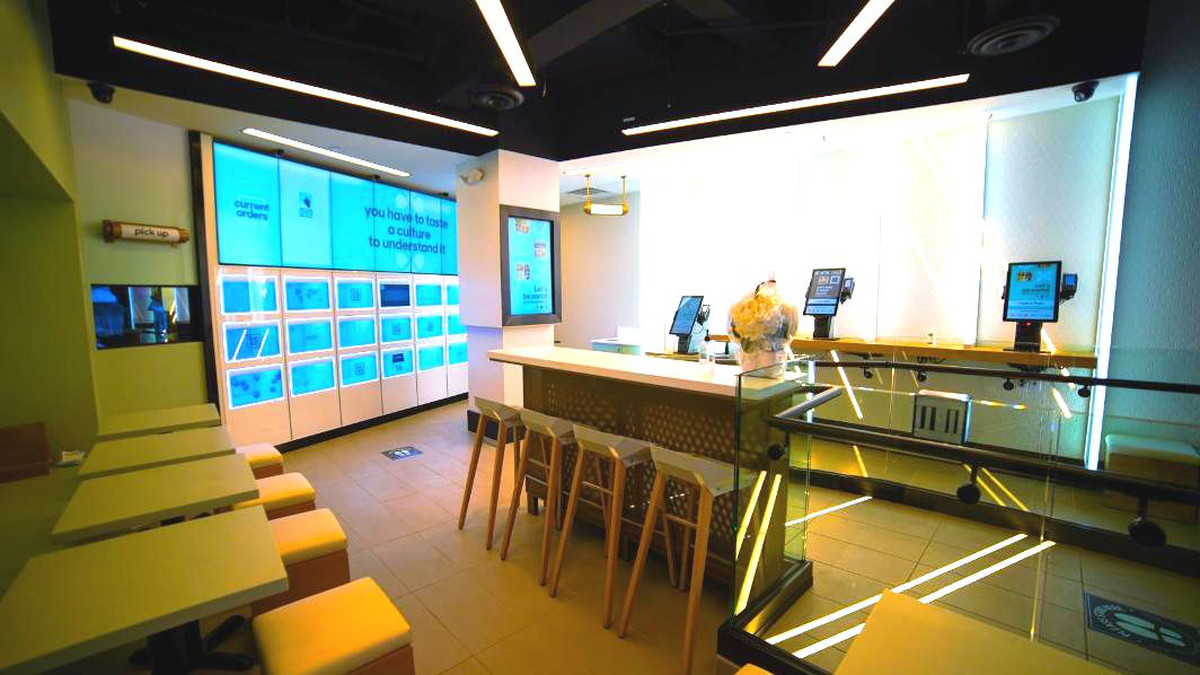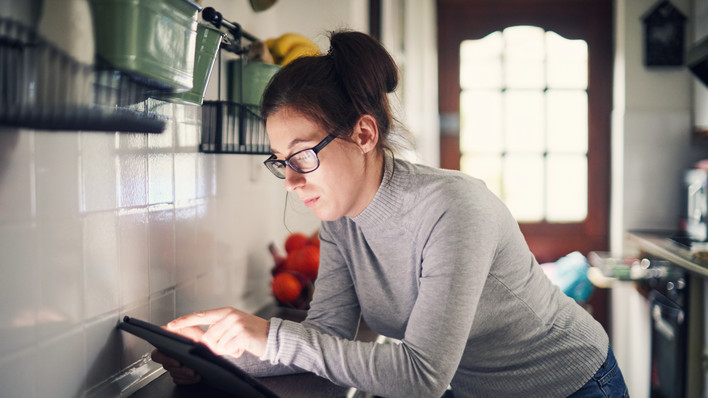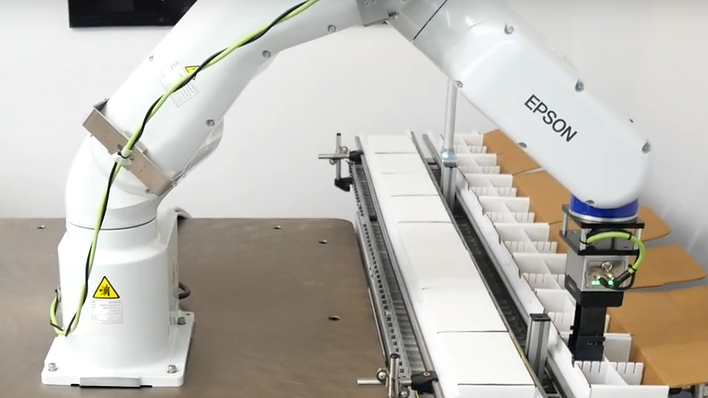We saw the rise and fall of automated restaurants a few years ago with the openings and subsequent closure of Eatsa.
Now, in the era of social distancing, is it time for a revival of the automat? One Toronto businessman is betting so, opening his new venture: an automated restaurant dubbed Box’d.
If that conjures the idea of robotic chefs and Jetsons-esque technology, well, not quite. The restaurant is fully automated — customers order via a branded app or Box’d’s website and pick up their meals from an electronic cubby. But founder Mohamad Fakih has worked in human touchpoints that bridge the gap between hospitality and technology, a chasm that has caused the downfall of other automats.
A concierge greets customers, helping them navigate ordering systems and enforcing social-distancing regulations.
Food is prepared by real chefs, not machines. A glass window into the kitchen allows customers to watch chefs prepping, cutting and preparing dishes. “Since we set up the window, everyone walking by is taking photos. It serves very well in today’s Instagram-savvy market,” says Fakih.
The automat may sound like the perfect antidote to the crisis Covid-19 has created in the restaurant industry, but the idea came about long before the pandemic took hold.
“It’s like I had a crystal ball,” laughs Fakih. When the pandemic hit, he simply tweaked some features to accommodate sanitation and physical distancing.
Once meals are prepared, chefs pop the dishes into digitized cubbies — 18 in total — able to accommodate 18 orders every three to four minutes. Screens throughout the restaurant direct customers to their awaiting meals. Customers use QR codes on phones to open the cubbies, and boxes are sanitized after every use.
In many ways, Box’d pays homage to the automats popular across Europe, the ones that peddle food for drunk patrons in the wee hours, or convenience snacks in train stations. The idea for the automat was born in Germany, spreading like wildfire across the globe in the ‘50s. But it faded into nostalgia; its relevance commandeered by fast-food and fast-casual concepts.
In a recent visit to Europe, Fakih found most automats hadn’t developed past adding credit card capabilities to archaic 1950s-era designs. “I saw a few concepts, but they all had outdated technology.”
Why not create an automated product that addresses major issues that the high-traffic, fast-casual restaurants scene faces? “Food courts are busy. There are lineups,” he says. “Even when customers order online, in-person customers and kiosk orders create bottleneck delays.”
These issues are particularly glaring in the time of physical distancing, when face-to-face interactions are dangerous.
So he rejiggered the automat concept, adding features that would resonate with a workplace crowd, who place value in quick service and fresh food.
He knows he’s competing with delivery apps, but at Box’d, he says, food is picked up hot and fresh, unlike meals that undergo the rigmarole of arriving via courier.
Box’d’s interface sends orders to chefs ten minutes before customers arrive. On average, meals take seven to eight minutes to prepare, leaving a two-minute buffer period to ensure that delayed orders will not cause a backlog or crowds.
The menu spans lunch-friendly Lebanese cuisine. Think hummus (including truffle, beetroot and Scotch Bonnet), along with customizable fattoush, tabbouleh, and truffle-scented mujadara options.
One of the major backlashes around automats (and self-checkouts) is they require less employed labor and take jobs away from hospitality professionals.
“With Box’d, we’re actually hiring more people, just in different positions,” describes Fakih. “In a regular restaurant, you hire two people in the back and two in the front. We hire one person in the front and five people in the back.”
Fakih laughs, “We believe more cooks in the kitchen is a good thing.”
The ease of service with the cubby system generates more sales and allows the restaurant to hire more staff. “The only way you save on labor percentage in the food industry is by raising and increasing sales per hour. The cubby system increases our orders, that increases our sales.”
In 2006, after emigrating from Lebanon to Toronto, Fakih founded Paramount Fine Foods: a fledgling falafel shop in Mississauga, Ontario. It blew up, snowballing into the fastest-growing Middle Eastern chain in North America. There are now 76 franchises of Paramount Fine Foods.
Fakih is eyeing expansion in the future for Box’d, but for now, the brand will take over space in current Paramount Fine Foods.
“Right away, some of our bigger Paramount Foods will be turned into shop-in-shops, as our sales have been impacted due to Covid-19. We already own or pay rent on these spaces, so we’re going to split the expenses — half of it for Box’d, and half of it for Paramount.”
As the climate becomes less dire, the brand will expand into universities, hospitals and sports arenas.
But why go through with launching a business in this climate?
For him, it’s a message of love.
“I lived through the [Lebanese] civil war, and I will never forget this one moment,” he describes. “We had to live in bunkers for periods of time. One time, when I came out of the bunker with my dad, I asked him, ‘What’s going on? Why are you smiling? We just lived in a stinky bunker.’”
“He said, look, Mohamad, some people will never see the light. But the light will come again. We will rebuild the country. We will hire more people again, and we will open more businesses.”
(Fakih has been incredibly supportive of both the Canadian restaurant industry and the Middle Eastern community as a whole. Last year, he won a $2.5 million lawsuit against a mayoral candidate who made Islamophobic comments towards Fakih. In 2019, when a Toronto restaurant run by Syrian refugees was hit with racist threats, Fakih publicly offered his support. He raised $1.5 million for the families of Canadian victims killed in the Iranian plane crash in early 2020.)
“When you open a business,” Fakih continues, “It sends a beautiful message. It says you care about the community and you want to help in rebuilding. That’s exactly what is happening here. There is nothing normal about what happened to us in our life or in our business, but we’re trying to say that we as an industry can bounce back.”
He notes that the restaurant industry is incredibly resilient. “We’re entrepreneurs in the industry. We’re known to be innovative and to take things in our hands to resolve them. “
Though Box’d is fortuitously timed, it isn’t the first instance of automat restaurants upgrading to cater to a current consumer. Fast-casual restaurant Eatsa sprang onto the San Francisco scene, later expanding to New York and Washington, D.C.
It was touted as the “poster child for innovative new ideas.” But they closed last year, and rebranded as a restaurant customer growth platform named Brightloom.
What went wrong?
Some hypothesized that customers weren’t open to the change — they liked their restaurants just as they were, thanks.
But in the time of Covid-19, change seems to be the only option. Restaurants have pivoted to bottle shops, take-out, or pseudo-bodegas.
Where Eatsa failed before, it may have been an instance of timing: Box’d may be poised to thrive in this brave new post-Covid-19 world.
This article was written by Kate Dingwall from Forbes and was legally licensed through the NewsCred publisher network. Please direct all licensing questions to legal@newscred.com.
![]()



